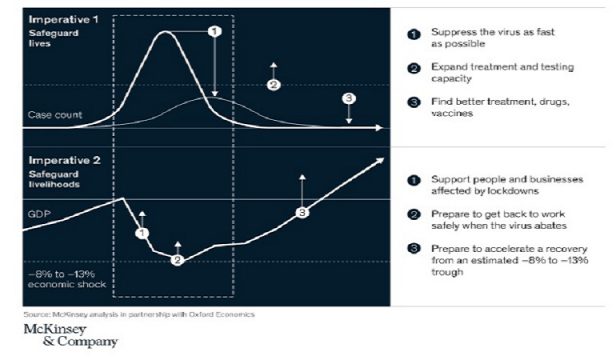
Everything has changed. Just a few weeks ago, all of us were living our usual busy lives. Now, things normally taken for granted – an evening with friends, the daily commute, a plane flight home – are no longer possible. Daily reports of increasing infections and deaths across the world raise our anxiety and, in cases of personal loss, plunge us into grief. There is uncertainty about tomorrow; about the health and safety of our families , friends, and loved ones; and about our ability to live the lives we love.
In addition to the immediate concern about the very real impact on human lives, there is fear about the severe economic downturn that may result from a prolonged battle with the novel coronavirus. Businesses are being shuttered and people are losing their jobs.
The impact of lockdowns on consumption and economic activity
We are learning what happens during a lockdown of the kind implemented in India, China, Italy, and increasingly across Europe and the United States: economic activity drops more sharply than any of us have experienced. People do not shop, other than for essentials; people do not travel; people do not buy cars.
We estimate that 40 to 50 percent of discretionary consumer spending might not occur.1 In every recession, people will cut back on purchases that can easily be postponed (such as cars and appliances), and increase precautionary saving in anticipation of a worsening crisis. What makes the coronavirus pandemic different is that people will also eliminate spending for restaurants, travel, and other services that usually fall but do not drop to zero.
A 40 to 50 percent drop in discretionary spending translates to a roughly 10 percent reduction in GDP—without considering the second- and third-order effects. That’s not only unprecedented in modern history, it has been historically almost unimaginable—until now.
Already, we have some factual evidence for an economic shock on this scale, such as the COVID-19-related economic downturn in China, and early indications in US “high-frequency data” such as credit-card spending.
The longer a lockdown is in place, the worse the impact on our lives will get. To visualize what this means for people in lockdown areas, imagine cab drivers whose customers are not allowed to go onto the streets; professional chefs whose restaurants have been forced to close; and grounded flight attendants, their planes parked at the airports—for months. With 25 percent of US households living from paycheck to paycheck, and 40 percent of Americans unable to cover an unexpected expense of $400 without borrowing, the impact of extended lockdowns for many, many people will be nothing short of catastrophic.
The answer cannot be that we accept that the pandemic will overwhelm our healthcare system, and thousands, if not millions, will die. But can the answer be that we cause potentially even greater human suffering by permanently damaging our economy?
Source : McKinsey Insights
